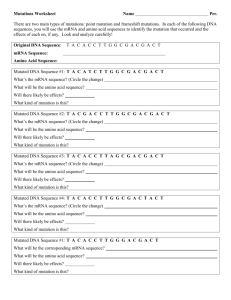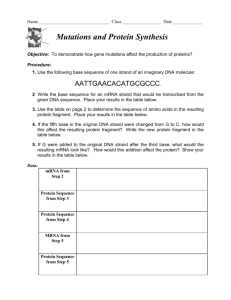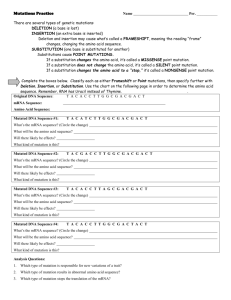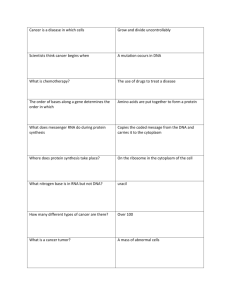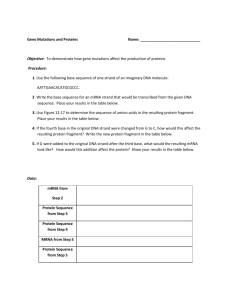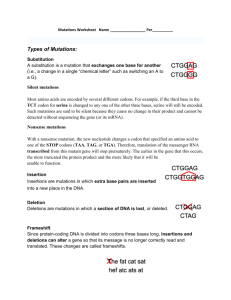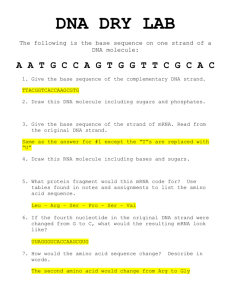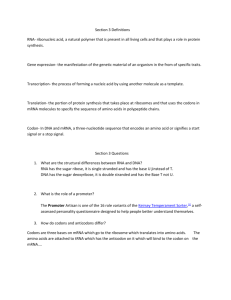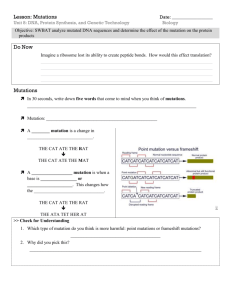Mutations Worksheet - Manhasset Public Schools
advertisement
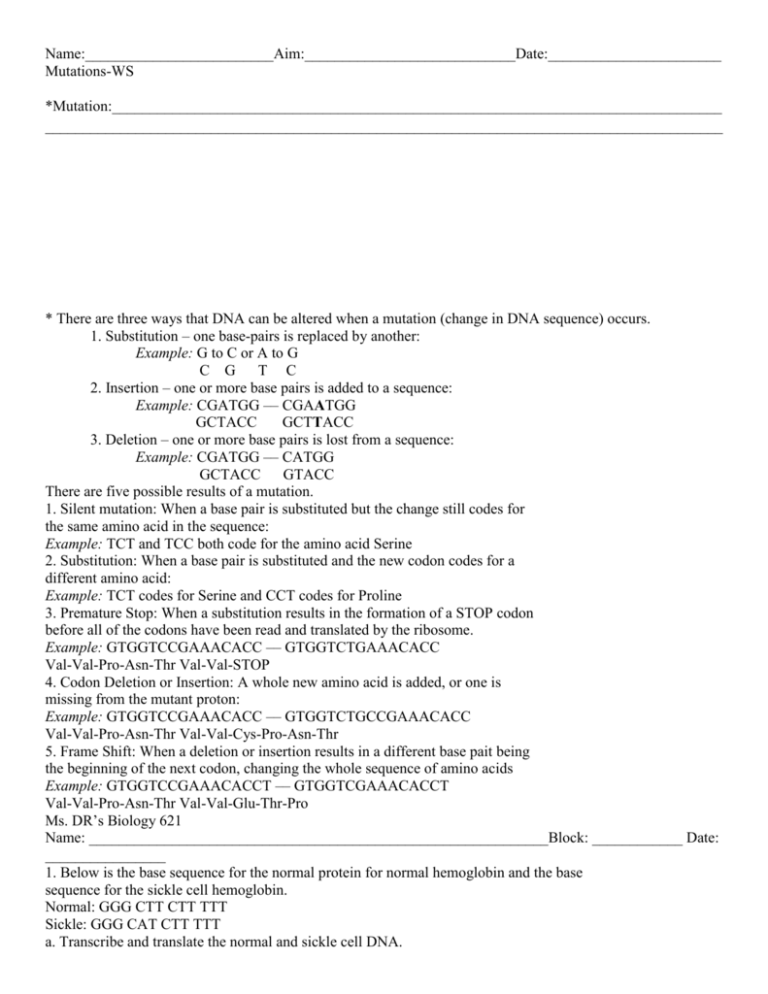
Name:_________________________Aim:____________________________Date:_______________________ Mutations-WS *Mutation:_________________________________________________________________________________ __________________________________________________________________________________________ * There are three ways that DNA can be altered when a mutation (change in DNA sequence) occurs. 1. Substitution – one base-pairs is replaced by another: Example: G to C or A to G C G T C 2. Insertion – one or more base pairs is added to a sequence: Example: CGATGG –– CGAATGG GCTACC GCTTACC 3. Deletion – one or more base pairs is lost from a sequence: Example: CGATGG –– CATGG GCTACC GTACC There are five possible results of a mutation. 1. Silent mutation: When a base pair is substituted but the change still codes for the same amino acid in the sequence: Example: TCT and TCC both code for the amino acid Serine 2. Substitution: When a base pair is substituted and the new codon codes for a different amino acid: Example: TCT codes for Serine and CCT codes for Proline 3. Premature Stop: When a substitution results in the formation of a STOP codon before all of the codons have been read and translated by the ribosome. Example: GTGGTCCGAAACACC –– GTGGTCTGAAACACC Val-Val-Pro-Asn-Thr Val-Val-STOP 4. Codon Deletion or Insertion: A whole new amino acid is added, or one is missing from the mutant proton: Example: GTGGTCCGAAACACC –– GTGGTCTGCCGAAACACC Val-Val-Pro-Asn-Thr Val-Val-Cys-Pro-Asn-Thr 5. Frame Shift: When a deletion or insertion results in a different base pait being the beginning of the next codon, changing the whole sequence of amino acids Example: GTGGTCCGAAACACCT –– GTGGTCGAAACACCT Val-Val-Pro-Asn-Thr Val-Val-Glu-Thr-Pro Ms. DR’s Biology 621 Name: _____________________________________________________________Block: ____________ Date: ________________ 1. Below is the base sequence for the normal protein for normal hemoglobin and the base sequence for the sickle cell hemoglobin. Normal: GGG CTT CTT TTT Sickle: GGG CAT CTT TTT a. Transcribe and translate the normal and sickle cell DNA. Name:_________________________Aim:____________________________Date:_______________________ Mutations-WS b. Identify this as a point or frameshift mutation. Explain. c. If the base sequence read GGG CTT CTT AAA instead, would this result in sickle cell hemoglobin? Explain. Ms. DR’s Biology 621 Name: _____________________________________________________________Block: ____________ Date: ________________ 2. There are several types of genetic mutations. List two. What do they have in common? How are they different? Give an example of each. 3. A geneticist found that a particular mutation had no effect on the protein coded by a gene. What do you think is the most likely type of mutation in this gene? Why? 4. Name one amino acid that has more than one codon. Name an amino acid that has only one codon 5. Look at the following sequence: THE FAT CAT ATE THE RAT. Delete the first H and regroup the letters in groups of three- write out the new groups of three. Does the sentence still make sense? What type of mutation is this an example of? You have a DNA sequence that codes for a protein and is 105 nucleotides long. A frameshift mutation occurs at the 85th base- how many amino acids will be correct in this protein? 6. Given the following three mRNA sequences, 2 code for the same protein. Which two? #1. AGU UUA GCA ACG AGA UCA #2 UCG CUA GCG ACC AGU UCA #3 AGC CUC GCC ACU CGU AGU Mutations Worksheet Name There are three main types of mutations: point missense mutations, point nonsense mutations, and frameshift mutations. In each of the following DNA sequences, you will use the mRNA and amino acid sequences to identify the mutation that occurred and the effects of each on, if any. Look and analyze carefully! Original DNA Sequence: T A C A C C T T G G C G A C G A C T mRNA Sequence: Amino Acid Sequence: Mutated DNA Sequence #1: T A C A T C T T G G C G A C G A C T What’s the mRNA sequence? (Circle the change) What will be the amino acid sequence? Will there likely be effects? What kind of mutation is this? Mutated DNA Sequence #2: T A C G A C C T T G G C G A C G A C T What’s the mRNA sequence? (Circle the change) What will be the amino acid sequence? Will there likely be effects? What kind of mutation is this? Name:_________________________Aim:____________________________Date:_______________________ Mutations-WS Mutated DNA Sequence #3: T A C A C C T T A G C G A C G A C T What’s the mRNA sequence? (Circle the change) What will be the amino acid sequence? Will there likely be effects? What kind of mutation is this? Mutated DNA Sequence #4: T A C A C C T T G G C G A C T A C T What’s the mRNA sequence? (Circle the change) What will be the amino acid sequence? Will there likely be effects? What kind of mutation is this? Mutated DNA Sequence #1: T A C A C C T T G G G A C G A C T What will be the corresponding mRNA sequence? What will be the amino acid sequence? Will there likely be effects? What kind of mutation is this? 1. Which type of mutation is responsible for new variations of a trait? 2. Which type of mutation results in abnormal amino acid sequence? 3. Which type of mutation stops the translation of the mRNA?
